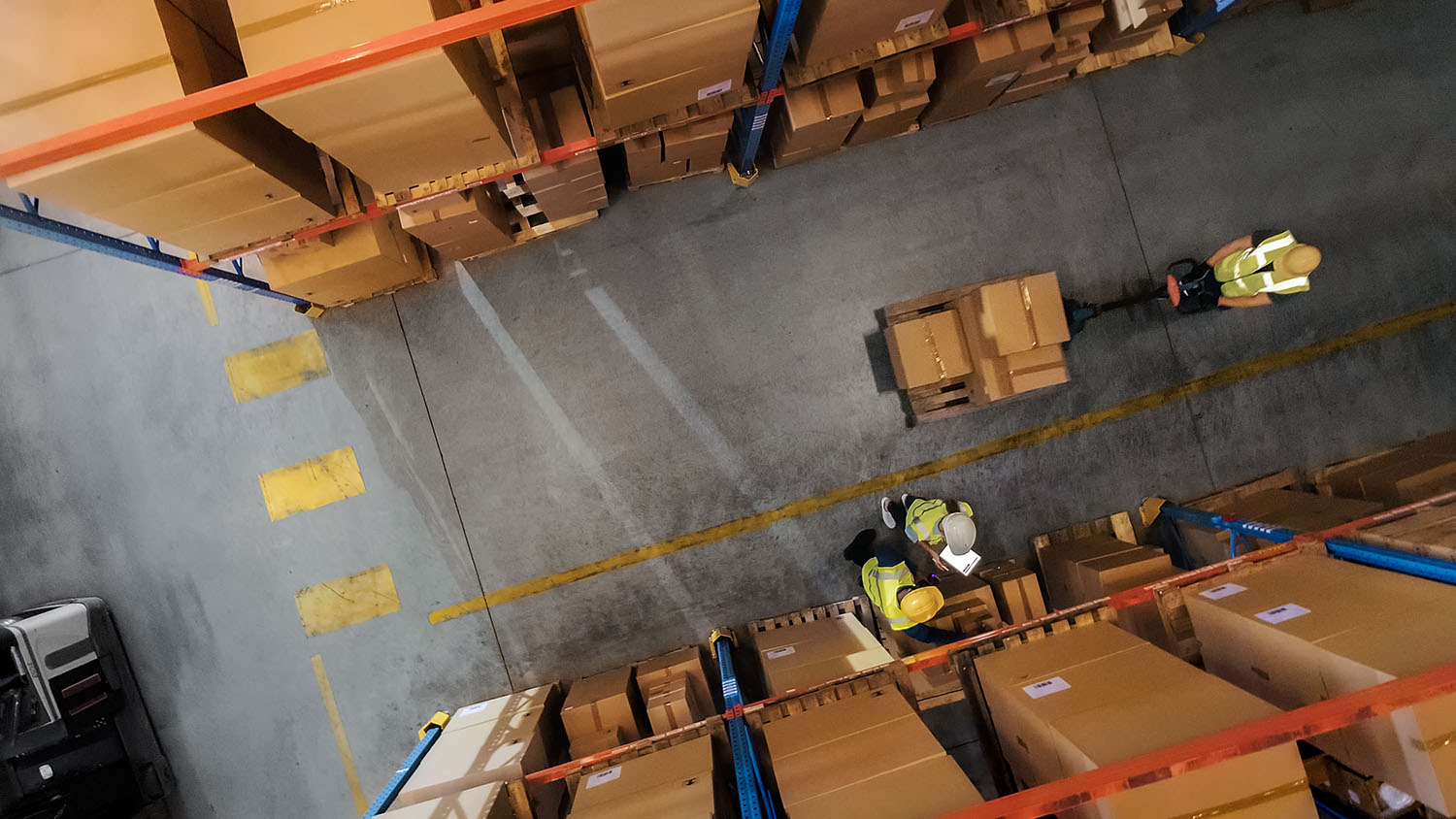Are you figuring out how to choose a 3PL WMS to scale your business? You need all the help you can get!
Scaling a 3PL business requires managing increasing client complexity, storage, and order volumes while still maintaining high levels of customer satisfaction.
A scalable Warehouse Management System (WMS) can make the difference between seamless expansion and operational chaos for a 3PL.
The Importance of Choosing the Right 3PL WMS
When you know how to choose the right 3PL WMS, you will improve efficiency, accuracy, and customer satisfaction in your business. But choosing the wrong one? That can slow you down, frustrate clients, and make scaling your business a nightmare.
Let’s break down why getting this decision right matters so much.
Boosts Operational Efficiency
Continuing to rely on spreadsheets or manual checks is extremely prone to error; ask JP Morgan about its 2013 tangle with a runaway Excel sheet. A good 3PL WMS, to the contrary, helps you automate the tasks that drive up your business’s margins: receiving, picking, packing, shipping, and managing inventory. A WMS that can automatically assign picking tasks to the nearest available worker, reducing travel time and speeding up order fulfilment, can alone pay for itself quickly.
Improves Accuracy And Reduces Errors
With barcode scanning and real-time inventory tracking, a quality WMS can drastically reduce picking and shipping errors. Imagine sending the wrong item to a customer because of a mislabeled product or stockout. These small mistakes can quickly add up to lost clients and poor reviews, which can negatively affect your business.
Supports Business Growth
As your client base and order volume grow, your operations need to scale with them. The right WMS makes this possible by handling more complex workflows, integrating with your clients’ systems (like ERPs or eCommerce platforms), and supporting multi-warehouse operations without stress. Let’s say you add a second warehouse in another city; a scalable WMS can manage both locations under one system, giving you full visibility and control even when you’re away.
Improved Client Satisfaction
3PL clients today expect transparency and speed. A WMS with real-time reporting, client dashboards, and automated notifications can help you provide that. Say a client wants to check their inventory levels or track an order, your WMS should be able to give them instant answers without any manual input from your team.
Reduces Labour Costs
Labor is one of the highest warehouse costs. The right 3PL WMS can optimize workforce productivity by using smart task assignments, reducing idle time, and identifying any inefficiencies. It also helps new staff get up to speed faster by guiding them through tasks with minimal training.
What to Look for in a Scalable 3PL WMS
Since your goal is to scale your business, there are specific features to look out for when figuring out how to choose a 3PL WMS. Focusing on these features while assessing different 3PL WMS options will ensure you get value for money.
Flexibility In Configuration
Flexibility in configuration allows businesses to tailor the system to specific operational requirements. A WMS must be easily configurable to meet the evolving needs of a growing 3PL business. Whether it’s building workflows, customizing reporting, or integrating new modules, a flexible WMS ensures that the system can adapt to changes without significant disruptions.
This adaptability is crucial for businesses that deal with diverse clients and varying product lines, enabling them to provide personalized services while maintaining consistency.
Seamless Integration Capabilities
Integration capabilities are vital for a scalable WMS. Your 3PL WMS should seamlessly integrate with other critical systems such as ERP, CRM, and TMS. These integrations ensure that data flows smoothly across different platforms, reducing manual data entry and the risk of errors.
By having a unified system, businesses can achieve greater visibility and control over their operations, leading to better decision-making and improved efficiency. For instance, real-time data synchronization between the WMS and TMS can optimize shipping routes and schedules, reducing transportation costs and delivery times.
Support For Multi-Client Operations
3PL providers often manage a large number of clients with unique requirements. Therefore, a WMS that supports multi-client operations is essential. Such a system should offer features like customer-level configurations, which allow for customized workflows, reporting, and document generation for each client.
Additionally, a WMS with robust multi-client support can help businesses scale by efficiently onboarding new clients and managing increasing complexity without compromising service quality.
Automated 3PL Billing
A scalable WMS with automated 3PL billing can handle various pricing models, generate accurate invoices, and streamline the billing process. This automation reduces the administrative burden and minimizes errors, ensuring timely and precise billing. By incorporating automated 3PL billing, businesses can improve financial management, reduce overhead costs, and focus more on strategic growth.
Scalability In Infrastructure
A 2022 Research by WERC showed that 77% of warehouses use some form of WMS; however, the sophistication levels of these tools varied greatly. A cloud-based WMS like Da Vinci offers unparalleled flexibility and scalability, allowing businesses to expand their operations without the need for significant upfront investments in IT infrastructure. With a cloud-based WMS, companies can scale their storage and processing capabilities in line with their growth, ensuring they can always handle increasing volumes.
Cloud-based systems also typically provide improved accessibility, enabling staff to access the system from anywhere, facilitating remote management, and improving collaboration across multiple locations.
Advanced Real-time Analytics And Reporting
Advanced analytics and reporting capabilities are essential for effective warehouse management and optimization. These features provide valuable real-time insights into warehouse operations, helping businesses identify trends, optimize processes, and make informed decisions. By leveraging these insights, businesses can continuously improve their operations, implement effective growth strategies, and maintain a competitive edge in the market.
9 Common 3PL Selection Mistakes To Avoid
3PLs can make costly mistakes when figuring out how to choose a 3PL WMS, such as prioritizing cost over functionality, overlooking integration capabilities, or choosing the most popular tool even when it doesn’t fully align with your business needs.
The good news is that these mistakes are completely avoidable if you have the right information.
1. Chasing the Lowest Price
Choosing a 3PL WMS based purely on cost can backfire. Very low rates are signs of poor tech infrastructure, outdated or unconfigurable solutions, poor post-purchase client service, or inconsistent quality control.
Instead of trying to prioritize low cost over functionality, focus on total value, including reliability, accuracy, and service flexibility.
Look beyond the initial quote and evaluate the total cost of ownership and the estimated long-term benefits of the WMS. Move beyond basic licensing costs to evaluate comprehensive implementation expenses.
Calculate time savings from automated billing, reduced error rates in order processing, and the efficiency gains from optimized warehouse workflows. Solutions that eliminate 20 hours of weekly manual data entry or improve order accuracy by 30% deliver compounding returns as your operation grows.
2. Failing to Align on Expectations Early
Before signing any contract, clearly define your service level expectations, KPIs, and escalation protocols.
Also, evaluate your existing processes with the WMS provider, such as order volume fluctuations, return handling, and error resolution, to avoid surprises down the line. Keep key stakeholders from IT and warehouse operations in the loop while making a decision.
3. Overlooking Scalability And Flexibility
A 3PL WMS might suit your business today but fall short as you continue to scale. Studies show that 40% of 3PLs are still using WMS that are more than 5 years old and have outdated features.
Choose a cloud-based WMS with modern tech features like API integration capabilities and real-time analytics that can grow with your business, reduce errors, and help you meet your goals, especially as you expand into new markets.
4. Rushing Vendor Selection
It’s tempting to go with a familiar name or the first flashy demo. However, every warehouse operates differently, and a system that works for a retailer might not suit a cold chain 3PL. So, it’s important to take your time when choosing a vendor. Instead of rushing, run a structured Request For Proposal (RFP) process and shortlist 3 to 5 vendors.
Request sandbox trials and speak directly to reference clients, especially those in your exact industry niche. Since your focus is scaling your business, ask questions like, how did the system perform during peak season? What’s support like post-implementation? The answers will provide more insight into the different tools and help you decide. 5.
5. Overlooking Integration Capabilities
Imagine buying a WMS only to find out it doesn’t fully integrate with your existing CRM or ERP systems. You also don’t want to invest in a WMS and still have to deal with manual workflows and annoying data silos. Choose a WMS that supports open APIs and has proven integrations with tools your business already uses or plans to use.
Modern 3PLs serve retailers across multiple e-commerce ecosystems. Your WMS needs proven connectors to major platforms like Shopify, Amazon, and NetSuite, while maintaining the ability to integrate with legacy systems that many established businesses still depend on.
Da Vinci’s approach—combining pre-built integrations with experienced configuration development—ensures you won’t lose potential business because of technical limitations.
6. Underestimating Ease of Use
The 3PL industry is fast-paced, so you can’t afford a long downtime simply because your team is trying to learn a new WMS.
Time is money in logistics. If your floor staff struggles to use the system, their morale will suffer, which could result in more errors and inefficiency issues.
Choose a WMS with a clean, intuitive interface. If it offers mobile-friendly access for scanning or picking, that’s even better. Vendors should also provide thorough onboarding programs, role-based training modules, and on-demand support during implementation.
7. Ignoring Your Own Growth Trajectory
Your chosen WMS should anticipate expansion—whether that’s geographical reach or service diversity. Prioritize platforms like Da Vinci that handle complexity through adaptive warehouse configurations and multi-location inventory optimization.
If you’re wanting to add services like temperature-controlled storage, returns processing, or assembly operations, the system should integrate these workflows seamlessly. Avoid “all-or-nothing” solutions that force expensive customization for each new capability.
8. Not Talking to 3PLs Who Use the WMS
Theory meets reality in peak season operations. Request case studies from 3PLs handling your target client volume and product complexity. Evaluate metrics around order accuracy during high-volume periods, system response times when processing thousands of transactions daily, and vendor support quality during critical periods.
A truly scalable WMS demonstrates consistent performance regardless of throughput demand.
9. Thinking About the Partnership Short-term
The ideal WMS provider functions as an extension of your operational team. Look for vendors with regular software updates, clear development roadmaps, and proven experience scaling 3PL operations.
Choose partners who understand warehouse economics deeply enough to recommend optimizations beyond standard features—companies like Da Vinci that evolve alongside your business rather than simply providing a static software license.
Questions to Ask Before Choosing a 3PL WMS
Before committing to any WMS solution, ask these critical questions to make sure it aligns with your business goals and operational needs to scale:
- Can the WMS scale with my current and future warehouse needs?
Ask about the system’s capacity limits, number of SKUs, and support for multiple locations.
- Does it support my clients’ integration needs (e.g., ERPs, eCommerce platforms)?
Check for API support and plug-and-play integrations with tools like Shopify, NetSuite, or SAP.
- What do implementation and onboarding look like?
Get clarity on timelines, training, and support to avoid prolonged operational disruptions.
- How customizable is the system for different client workflows?
Ensure the WMS allows multi-client configurations and flexible workflow setups.
- What reporting and analytics capabilities are available?
Ask if you can access real-time dashboards, trend analysis, and customized reports.
- What’s the true cost of ownership?
Beyond licensing, factor in training, support, maintenance, and potential upgrade fees.
- How secure is the platform?
Ask about data protection, uptime guarantees, and compliance with industry standards.
Scale Your 3PL Business With Da Vinci Cloud-Based WMS
Cloud-based WMS is becoming vastly popular among 3PLs, and Da Vinci has built a flexible, powerful system designed to grow with 3PLs that are taking on new warehouses and clients.
Da Vinci addresses the critical balance between cost and capability that many 3PLs struggle with. Rather than offering the lowest price or forcing you to choose between features and budget, we calculate total value based on your operational needs and willingness to learn how to self-serve as client needs evolve.
What sets Da Vinci apart is our partnership approach to growth. We maintain regular software updates, provide clear development roadmaps, and support your business with built-in configurations and responsive technical assistance.
We evolve as your 3PL business scales, ensuring your technology investment delivers increasing returns year after year.
Request a Demo of Da Vinci’s cloud-based WMS and take your 3PL business to long-term success.



